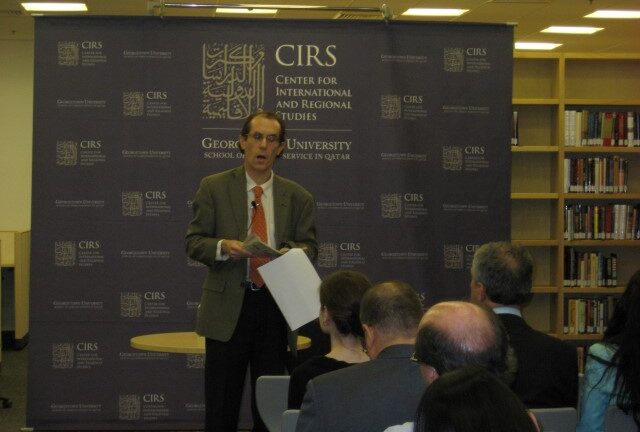Dialogue Series, Race & Society, Regional Studies
Patrick Laude on the Ambassadors of Inner Islam

On November 28, 2007, forty invited guests gathered in the Georgetown University School of Foreign Service in Qatar Library to listen to Professor Patrick Laude speak about “The Ambassadors of Inner Islam and the Encounter of Religions.”This lecture was part of CIRS’s on-going Monthly Dialogue Series. Laude is Professor of French, a Sorbonne graduate and author of nine books, including Pray Without Ceasing: The Way of the Invocation in World Religion, 2006, Divine Play, Sacred Laughter and Spiritual Understanding, 2005, Singing the Way: Insights in Poetry and Spiritual Transformation, 2005, Frithjof Schuon (1907-1998): Life and Teachings, 2004, Massignon intérieur, 2001, and Approches du quiétisme, 1992.
Professor Laude explained the main tenets of his current research which focuses on the contributions of three eminent European Islamic Studies scholars to Islamic studies and inter-religious studies. Louis Massignon (1883-1962), Henry Corbin (1903-1978) and Frithjof Schuon (1907-1998) set themselves apart from Orientalist research and the abstract detachment that was a prerequisite for scientific objectivity by demonstrating the forgotten but fertile connection between faith and scholarship. Laude explained that the spiritual realm that these scholars were interested in is one that cannot be reduced to the prevalent social or political concerns.
Laude gave a brief account of his own relationship with the subject, explaining what makes these particular scholars worthy of being named Ambassadors of Islam, and explaining what lessons could be learned in relation to the co-existence of religions. All three scholars, although studying the same topic, came from different intellectual paradigms ranging from the Christian and mystical to the phenomenological and the perennialist.
The title “Ambassadors of Islam”, Laude explained, is meant to give the sense that these scholars introduced the West to Islamic ideas found in the realm of a broader spiritual and philosophical understanding. In fact, Massignon was a Catholic scholar and priest who devoted his life to the study of Islam and Arabic, as he believed this language to be the language of transcendence. He was able to partake in a spirituality that extended beyond strict religious boundaries while being grounded in the Christian mysteries of faith. Corbin was steeped in German philosophy and Protestant theology, and became the prominent European expert in Shiite theosophy, while Schuon has been recognized as the foremost expositor of the perennial philosophy based upon the principle of the “transcendent unity of religions.”
Further to being representatives of Islam in the West, these thinkers represented a marginalized and forgotten aspect of Islam; they revived its spiritual and intellectual heritage. These scholars had a profound influence on some sectors of the Islamic intelligentsia especially in South East Asia.
Laude explained how these three Ambassadors of Islam emphasized the importance of a spiritual “congeniality” with or “sympathy” toward the object of religious studies, a re-evaluation of the centrality of the poetic and the imaginal in approaching spiritual traditions, and above all the commonality and transcendence of a universal horizon of spirituality beyond the formal differences that separate religions. As such, they saw Sufism as an embodiment of the spiritual fulfillment of Islam from a law into a spiritual way of being open to other faiths.
All three scholars’ legacy is some measure of recognition in a spiritual and metaphysical unity of all the great religions; an essential commonality that is in no way contradictory with the formal, theological and ritual diversity that characterizes the religious world. Therefore, one lesson that can be learned from these thinkers is not only the recognition of others’ religions but also the understanding of the metaphysical and anthropological necessity of the multiplicity of spiritual traditions. The unity of religions espoused, to varying degrees, by these scholars, in a way that is more implicit and Christ-centered in Massignon, more hermeneutic in Corbin’s works, and fully articulated in Schuon and the perennialist school, is not found in the literal sense of religions but resides in the encompassing and inclusive nature of the spiritual and the philosophical understanding of the religious phenomenon.
Summary prepared by Suzi Mirgani, CIRS staff member.